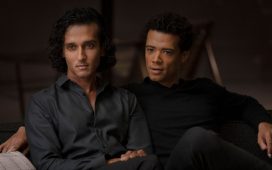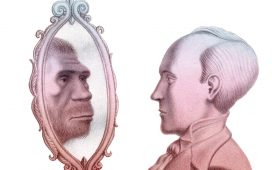When the playwrights and writer-producers Liz Flahive and Carly Mensch created “GLOW” for Netflix, in 2016, they had rich source material and high-flying narrative challenges to contend with. “GLOW: Gorgeous Ladies of Wrestling,” the late-eighties crazy-bananas show that inspired it, featured, in an era giddy with wet-T-shirt contests and jello wrestling, a leotard-costumed cast of characters with names like Babe the Farmer’s Daughter and Matilda the Hun fighting each other for audiences’ viewing pleasure. Yet for many of those women the “GLOW” experience was surprisingly liberating. The show was run by male eccentrics with money, shot in Vegas, and adored by young boys across the country. For Flahive and Mensch, the challenge was to find the depth in these stories while managing an unwieldy amount of characters and expositional detail, and to do it amid a hurricane of glitter, cultural stereotypes, and body slams.
For the first two seasons and the beginning of the third, the results were mixed—nuanced moments amid a script that added operatic personal drama to an already outrageous, overstuffed scenario. “GLOW” can be exhausting. But it’s packed with great performances from its many characters, including Marc Maron, as Sam Sylvia, the show’s somewhat lovably cranky director, and Betty Gilpin and Alison Brie, as the show’s complicated stars. So I was excited when, a few episodes into Season 3, “GLOW” reached unexpected heights of emotional power and began to shed its flaws. As the season continues, it gathers strength—like a seasoned wrestler who, having been flung out of the ring, crawls back into it, picks her opponent up like a barbell, and hoists her aloft in triumph.
The season begins on the stadium floor, with an oof. My problems with “GLOW,” historically, have fallen into two categories. The first is the handling of the stereotyped characters (Welfare Queen, Fortune Cookie, Beirut the Mad Bomber, and so on), which ranges from smart to tedious to overly pleased with its own satire. The second is the overdetermined drama in the central story arc, in which Debbie (Betty Gilpin) and Ruth (Alison Brie), best friends and struggling actors, fall out after Ruth sleeps with Betty’s husband, are cast on “GLOW” as the American sweetheart Liberty Belle and the Soviet archvillain Zoya the Destroyer, and contend with each other in and out of the ring. Notes of catfighting, Good vs. Evil Empire—it’s all a bit much. In Season 2, their conflict culminates in an act of shocking injury—also too much—but it forces a resolution and, happily, allows us all to move on from that plot line.
The Season 3 opening brings us up to date on both situations. The Soviet-U.S. rivalry rattles along, via Liberty Belle and Zoya, and, with it, Zoya’s wearying mock-Russki accent. The show has moved from L.A. to Las Vegas, into a has-been hotel and casino called the Fan-Tan, and as a publicity stunt Liberty Belle and Zoya go on a live local morning show to taunt each other, Cold War style, during the launch of the Space Shuttle Challenger. (“That puny rocket look like child’s toy. . . . I spit on this Challenger mission!”) After the Challenger explodes, killing its seven crew members, Debbie tells the cameras to cut, and we jauntily segue to the show’s neon-lit, get-pumped intro sequence and theme song, “The Warrior.” Awkwardly half-comedic scenes follow, of Ruth feeling terrible, and of GLOW’s man-child producer, Bash (Chris Lowell), realizing in horror that the opening-night party he’s throwing is space-themed. (Oh no!) I found myself feeling nostalgic for the way “Mad Men” handled the J.F.K. assassination, with Roger sitting glumly at his daughter’s underpopulated wedding reception. The Challenger plot feels tonally off and too on the nose—not worth the use of the tragedy as material.
Season 3 improves as the writers move the characters beyond the roles that they’re stuck in, as wrestlers and as people. The Vegas plot line gives the show a stable setting and an intriguing milieu—a comfortably absurd place to spend time in, allowing our friends a bit more freedom and happiness—and the new setup lets the show within the show, having established a routine, to be less of a focus. Debbie became a producer in Season 2, and we watch with satisfaction as she thrives in the role, finds a way to incorporate her toddler into her working life, and begins dating a tycoon with a warm sense of humor, wonderfully played by Toby Huss (who was also wonderfully terrifying in Lynn Shelton’s “Sword of Trust,” starring Maron, this summer). Ruth navigates a stable but long-distance relationship with a kindhearted cameraman while figuring out her more stimulating relationship with Sam; Sam continues to mature as he helps his daughter navigate her fledgling film career. Many wrestlers get rewarding new arcs, among them Jenny (Ellen Wong), who plays Fortune Cookie; Arthie (Sunita Mani), who plays Beirut; and the spooky Sheila the She-Wolf (Gayle Rankin), who undergoes a freeing de-gothification process. Some of their transformations are set in motion by an episode in which the wrestlers switch characters, which is as fun (and occasionally upsetting) for us as it is for them. But to me, the most exciting arc this season focussed on Bash—catalyzed by a stellar addition to the cast, Kevin Cahoon, who plays Bobby Barnes, a beloved and emotionally astute drag performer at the Fan-Tan.
“GLOW” has long implied that Bash—a cute, wrestling-obsessed naïf with family money to burn—is gay, closeted not only to the world but to himself. He’s now married, for green-card reasons and beard reasons, to Britannica (Kate Nash), one of the wrestlers. In Season 3 they manage to eke out an intriguing, semi-articulated kind of love, and even, at first, a happy sex life. Conventional wisdom led me to expect that Bash—a handsome, closeted innocent on a progressive show about an unenlightened era—would somehow manage to come out and find love with a man, giving such a character, for our emotional satisfaction, happiness that reality might not have fostered. But what “GLOW” does is riskier and more interesting—it explores a likelier trajectory, in which Bash goes further into the closet. (Spoilers follow.) In Episode 4, Bobby performs for Bash, in the hope that Bash will sponsor his playing a bigger room at the casino. (As Liza Minnelli, he sings “Yes,” from “Liza with a Z.”) But he’s also made the mistake of implying that he knows Bash is gay—and that, combined with his self-actualized camp persona, is more than Bash can handle. “Say yes—yes! ” Bobby sings, ending with a flourish. “Well?”
“No,” Bash says. He rejects him pointedly, cruelly—and for a few episodes he becomes a bit of a monster, showing us how a self-loathing gay man from a conservative world, at the height of the AIDS crisis, might spiral into fearful, destructive behavior, wielding his power in reckless ways. The season finale is a tour de force, for most of the characters and especially for Bash; in a scene in which Bash drunkenly confides in Debbie about his attraction to men, Lowell’s heartbreaking performance makes our emotions ratchet, in an instant, from contempt to tenderness. It’s as moving as anything I’ve seen on TV this year. Just as deftly, Gilpin evokes how Debbie’s empathy melds with her shrewd opportunism. Meanwhile, in the ring, the wrestlers are doing “A Christmas Carol,” complete with Ruth as Zoya as Scrooge (“Today, I defect from Communist Russia, and join in glorious American celebration!”) and Jenny as Tiny Tim. Netflix hasn’t yet announced the fate of “GLOW” and its lady wrestlers—but may it bless them, every one.







